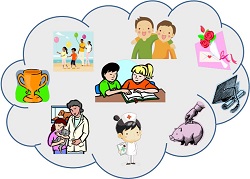Our home/family has the most dominant influence on our early lives but as time passes, parents and carers can expect support from teachers in the task of preparing their children for life – much of which is unpredictable and ever changing.
Teachers play a crucial role in educating and informing young people and promoting a secure sense of themselves, whatever the individual’s background and abilities. Some homes are loving and some are dysfunctional, but in partnership with parents and carers, educators need to help the next generation acquire positive character traits that will enable them to do justice to their talents and develop mindsets for effective, life-long learning.
For schools in England, the National Curriculum has three aims. The expectation is that all young people become:
- successful learners who enjoy learning, make progress and achieve;
- confident individuals who are able to live safe, healthy and fulfilling lives; and
- responsible citizens who make a positive contribution to society.
We are fast approaching the time when the concept and measurement of success during schooldays is redefined so that it extends beyond academic results and embraces young citizens’ character traits. Studies show that, irrespective of their backgrounds and IQ, emotional intelligence and qualities such as motivation and persistence are more reliable indicators of how well individuals will do in life.
It is important for children to recognise that working on different aspects of their personal development is essential to their wellbeing and success.
'Character is destiny' - George Eliot
Character traits are the attributes we possess that describe the nature of the kind of person we are. They relate to all aspects of our makeup. For example, our physical appearance, such as blue eyes, attractive, short; our emotional makeup, such as caring, volatile, mischievous; our role as a leader, such as persuasive, cold-hearted, trustworthy; and to our underlying values and beliefs, such as hardworking, forgiving, grateful. (See the attachment below for a selection of positive and less helpful and even bad character traits.)
Actions speak louder than words. Youngsters learn from watching others in various contexts - and they copy them. They observe how people present themselves, their mindsets and how they interact with others, with society and the world, near and far. In doing so, they begin to get some kind of measure of who the individuals really are and their qualities, good and bad.
A high IQ is no guarantee of success. There are plenty of instances of bright children who do not fulfill their potential and others who may not be as academically inclined but who, with inspiring goals, positive character traits and effort really do make something of their lives.
'Character is that which reveals moral purpose' - Aristotle
Considering the growing catalogue of scandals, such as those perpetuated by some politicians, bankers, police officers and celebrities, and deceptions, such as horsemeat in beef products and malpractices in hospitals, it becomes very clear that throughout their school days, children and young people must develop their own personal morality. They need to explore a wide spectrum of values and have the opportunity of putting them into practice in safe, supportive environments. In so doing, they gradually acquire essential life skills and establish meaningful principles and standards that they can draw on to guide their thinking, decision-making and behaviour.
High quality, systematic values education, as an integral part of the curriculum, establishes a calm, purposeful, inspiring atmosphere and is conducive to improving attainment levels. It underpins spiritual, moral, social and cultural (SMSC) development, cements personal, social, health and economic (PSHE) education, creates constructive thinking patterns for Citizenship and enriches social and emotional aspects of learning (SEAL). Importantly, it affords participants time for quiet reflection. It's a transformative, challenging process that helps young people create visions and goals, develop cognitive and reasoning skills, hone emotional and social competencies and enables them to enjoy making good, well considered choices consistently.
The examples they see around them, particularly those of parents, carers and teachers with whom they spend a significant part of each day, can and do affect them profoundly. Collaboration between parents, carers and educators and good role modelling can literally make a world of difference to children and young people and their prospects in life.


















